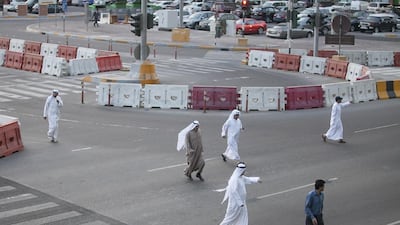ABU DHABI // Repeated warnings on the extreme danger of jaywalking are being ignored, with 1,175 people counted crossing three lanes of traffic to and from Abu Dhabi Mall in two hours of peak traffic.
Mothers pushing prams or with toddlers in tow, workers in business suits and elderly people put their lives at risk by ignoring the nearby footbridge and dodging traffic in Al Zahiya on Monday, between 5pm and 7pm.
Of those, eight were women with baby strollers, four were people pushing trolleys full of groceries and 21 crossed the street while using phones.
Road-safety experts say more jaywalkers need to be fined to discourage others.
“My view is that once people see other people crossing illegally and not getting ticketed, the numbers start swelling,” said Glenn Havinoviski, associate vice president for traffic solutions company Iteris in Abu Dhabi.
Mr Havinoviski said the presence of police officers at such spots was crucial in deterring jaywalkers.
“Unlike with speeding and the related licence-plate camera technology, you can’t just photograph a pedestrian and mail them a citation,” he said.
“Strict enforcement should be done, in conjunction with improved crossings.”
The Ministry of Interior is running a three-month awareness campaign on pedestrian safety as part of its plan to reduce the number of traffic accidents and pedestrians being run over.
Plainclothes police officers carry out random inspections and hand out fines to jaywalkers near the mall.
But Ramesh Menon, a technical officer who works on the 17th floor of the Abu Dhabi Mall building, said he had not seen them for about three months.
“So far I’ve not witnessed anyone being fined Dh200 for jaywalking this month,” Mr Menon said.
“The last time I’ve seen these officers was some time between the end of September and beginning of October last year.
“People will continue crossing the street at undesignated points unless they, a family member or a friend has previously been involved in an accident.”
The National counted 263 jaywalkers in 30 minutes, more than six times the number counted in September last year, when 42 people illegally crossed at the same time of day.
Abu Dhabi Municipality, which has installed steel footbridges across the city, did not respond to requests for comment.
Many of those illegally crossing the street on Monday were nonchalant about it.
“It’s OK, no problem,” said an Aramex courier when asked whether he was aware that by law he was prohibited from crossing the road.
An Indian man who did not want to be named said: “The bridge is very old, right? And the lift is not working.”
“I’m sorry,” said Martin Nkiti, 25, a Ugandan working at a restaurant in Abu Dhabi Mall. “I always use the bridge but I’m late for work.”
A couple visiting from Europe asked: “Are you giving us a fine? My wife doesn’t want to use the bridge. She’s lazy.”
Many of the pedestrian bridges, underpasses and mid-block crossings are not well located, Mr Havinoviski said.
“Especially in the summer, if people have to walk farther to get to the crossing than they have to actually get to their destination, then there is certainly an issue with pedestrian accessibility,” he said.
“Many of the existing crossings are not well maintained, and obviously someone crossing a beat-up metal skywalk or a dark tunnel will have concerns about their own safety.”
Thomas Edelmann, founder of Road Safety UAE, agreed.
“Pedestrians must not jaywalk in order not to get themselves into danger,” Mr Edelmann said.
“Authorities at the same time should also observe such places where crossings are needed and provide the suitable infrastructure.”
rruiz@thenational.ae

